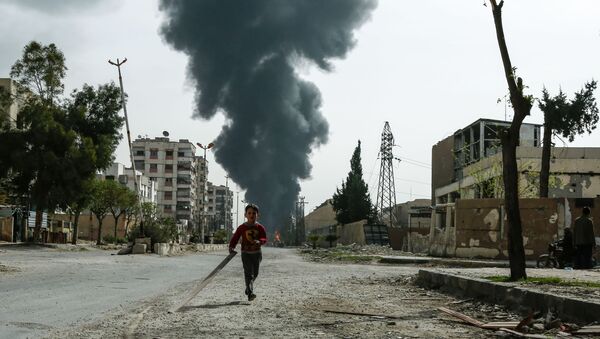Hours after the Russian Foreign Ministry issued a warning about upcoming provocations with the use of chemical weapons, reports from various NGOs, such us the infamous "White Helmets," who are suspected of ties with terrorist groups, started to surface of the alleged use of chemical weapons in Syria's Douma. Some NATO countries were quick to level a barrage of accusations against Damascus before any proper investigation has even been launched.
US & Co.: "Animal Assad" to Blame
US President Trump's reaction has been one of the harshest so far, calling Bashar Assad an "animal" and blaming Russia and Iran for supporting him. Moreover, he was quick to promise a "big price to pay" for the incident. White House Homeland Security and Counterterrorism Adviser Thomas Bossert may have given a hint as to this "price," saying that he wouldn't "take anything off the table" with regard to Syria. Considering the last time such ungrounded accusations were sounded from the White House, air strikes were also not taken off the table.
READ MORE: Trump Slams Putin, Iran for Backing "Animal Assad" Amid Chemical Attack Claims
The UK went along with Washington's sentiment. Although they were grounded enough to suggest that a thorough investigation must be conducted first, it doesn't seem that they really need one, as the British foreign secretary noted that should the attack be confirmed, it will show the Syrian government's "brutality." The EU's stance was considerably harsher and not allowing for any options other than Syrian President Bashar Assad being behind the attack, failing to give any details as to evidence establishing that.
The Turkish Foreign Ministry's statement didn't the same level of confidence in whom to blame, although it did express a "strong suspicion" that Damascus carried out the chemical attack. Still, it urged for an official investigation to be conducted into the incident. Their French colleagues followed suit and suggested gathering the UN Security Council to investigate the matter, but at the same time were not as quick to draw conclusions as its allies were.
READ MORE: Ankara Has 'Strong Suspicion' Damascus Behind Alleged Syrian Chemical Attack
Nine members of the Security Council have requested a special meeting to discuss the alleged use of chemical weapons in Douma.
Damascus, Moscow, Tehran: Groundless Accusations as a Pretext for Military Intervention
Damascus met the accusations with harsh criticism, denying all the allegations, calling them an excuse "to prolong the life of terrorists in Douma." It also reminded that Syria is waging a war on terrorism, while certain countries support the terrorists. Iran backed the message from Damascus, with foreign ministry spokesman Bahram Qasemi slamming it as an excuse to use military action against the Syrian government.
READ MORE: Moscow Warns Against Foreign Attack in Syrian Areas Where Russian Troops Located
Moscow is adamant in its position that a provocation involving chemical weapons has taken place in Syria's Douma perpetrated by terrorists against civilians to shift the blame on Damascus. The end goal of these actions, according to the Russian Defense Ministry, is to find an excuse for military intervention against the Syrian government. It also warned against such action, as it might lead to "severe consequences" as Russian servicemen are currently present in the country, deployed at the request of the official government.
It's April 2017 All Over Again: Khan Sheikhoun Chemical Incident
80 people were killed and 200 more injured in the Khan Sheikhoun incident on April 4, 2017, when a Sarin chemical weapon was used in Syria's Idlib province. Before an official OPCW investigation was concluded, the US unilaterally decided to conduct a missile strike on Syria's Shairat airbase on April 7, claiming it was in response to Damascus alleged use of sarin against the civilian population. The Syrian government rejected all allegations and slammed the US for the attack.
READ MORE: Russia Debunks UN-OPCW Report Blaming Damascus for Idlib Chemical Attack
Damascus strongly slammed the attack by a country that had been bombing targets inside Syria since 2014 without either a UN mandate or the Syrian government's approval, while Moscow accused Washington of violating the Arab Republic's sovereignty and called for a thorough probe into the incident. However, since then, the UN and OPCW haven't managed to provide any solid proof as to the Syrian government's involvement in the alleged attack, while also failing to send experts directly to the base, which had been suspected of being the source of the chemical weapons. The Russian Foreign Ministry has reminded that all chemical weapons had been removed from Syria in 2014 with US assistance under the Barack Obama administration. That has been confirmed by the OPCW on numerous occasions.




